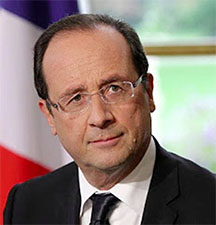NEW YORK/PARIS (Reuters) – The United Nations Security Council yesterday declared the Ebola outbreak in West Africa a “threat to international peace and security” as the death toll hit 2,630 and France became the latest Western nation to step up its support.

French President Francois Hollande announced the deployment of a military hospital to the remote Forest Region of southeastern Guinea, where the outbreak was first detected in March.
Since then the virus has infected at least 5,357 people, according to World Health Organisation (WHO), mostly in Guinea, neighbouring Sierra Leone and Liberia. It has also spread to Senegal and Nigeria.
With fragile West African healthcare systems overrun by the outbreak, Hollande said France’s response would not be limited to contributing €150 million ($194 million) in aid promised by European Union nations.
“We must save lives,” Hollande told a news conference. “I have asked the defence minister to coordinate this action and to include military doctors and the civil protection agency plus air support.”
UN Secretary-General Ban Ki-moon said he will create a special mission to combat the disease and deployed staff in the worst-affected states.
“The gravity and scale of the situation now require a level of international action unprecedented for a health emergency,” Ban said. He added that he will appoint a special envoy to head the UN Mission for Ebola Emergency Response, which will push a “rapid and massive mobilization” of people, material and financial resources.
“This international mission … will have five priorities: stopping the outbreak, treating the infected, ensuring essential services, preserving stability and preventing further outbreaks,” Ban told an emergency session of the Security Council.
WHO Director-General Margaret Chan said a surge of support could help turn things around for the roughly 22 million people in the hardest-hit countries, whose lives and societies have been shattered by the disease.





